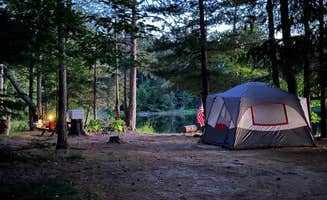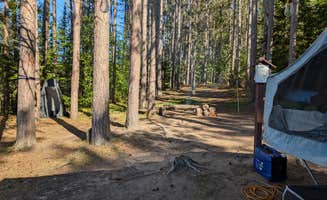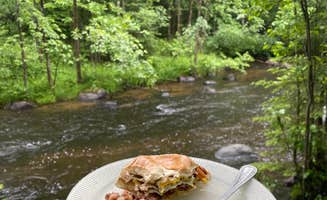Dispersed camping near Long Lake, Wisconsin offers primitive options across the Chequamegon-Nicolet National Forest at elevations averaging 1,500-1,700 feet. Winter camping remains possible in this region where temperatures can drop below 0°F, while summer brings relatively mild 70-80°F temperatures. Most dispersed sites in this area feature small, tranquil lakes with sandy shorelines suitable for swimming and paddling.
What to do
Wildlife observation: The small lakes around the Long Lake area provide excellent opportunities for loon watching. At Wolf Lake Campsite, campers regularly encounter resident loons. "I love this campsite. The small lake belongs to a pair of loons that will share their fish and sandy beach," reports Kay K. about Wolf Lake Campsite.
Paddling: Many of the dispersed sites feature non-motorized lakes perfect for kayaking and canoeing. The peaceful waters and sandy shores make for excellent paddling conditions. Woodbury Lake offers "a sandy beach great for swimming or paddling," according to Kay K., who visited Woodbury Lake Campsite.
Hiking: The forest service roads connect to numerous hiking trails throughout the area. "Many hiking opportunities are nearby," notes Kay K. about Indian Lake. Winter camping can provide access to seasonal trail activities with fewer crowds.
What campers like
Secluded waterfront sites: Campers appreciate the privacy found at many dispersed locations in the Long Lake area. "Two sites on lake some distance apart. Sand bottom on shore, picknick table and fire ring. No fee for camping can stay 14 days," writes hesselinkj@yahoo.com about Robinson Lake Dispersed Campsite.
Simple amenities: While basic, many sites offer more amenities than typical dispersed camping locations. At Harriet Lake, campers can find "fire ring and picknick table. Room for small camper 10to 15 foot also tents wilderness toilet. No motor lake," according to hesselinkj@yahoo.com about Harriet Lake Campsite.
No reservation required: Unlike developed campgrounds, these dispersed sites operate on a first-come basis. Most remain open year-round depending on road conditions, though summer weekends see higher demand. Weekday camping offers better site availability during peak season.
What you should know
Site limitations: Most sites accommodate only one camping group with limited parking. "Single campsite on small lake. Room for small camper in parking less than 15 foot. Fire ring and picknick table. Road to get in is narrow and pot holed," explains hesselinkj@yahoo.com about Bose Lake Campsite.
Road conditions: Access roads vary significantly in quality. Forest roads may deteriorate during spring thaw or after heavy rainfall. Gravel roads can become dusty in summer months. High-clearance vehicles handle these conditions best.
Cell service: Connectivity remains unreliable throughout the Nicolet National Forest. Pack paper maps and download offline navigation before arrival. Winter campers should prepare for complete isolation when snow affects roads.
Tips for camping with families
Beach access sites: Several dispersed sites feature sandy lake access ideal for children. Woodbury Lake offers a small beach area with gradual water entry. "This remote site has a sandy beach great for swimming or paddling. There is space for a trailer," notes Kay K.
Pack extra water: With no potable water sources at these sites, families should bring 1-2 gallons per person per day. Small water filters can supplement supplies from lake water for non-drinking purposes.
Campsite selection: Arrive early (before 2pm) on summer weekends to secure desired sites. The single site at McKinley Lake Dispersed offers good lake access with a flat tent area. "A single campsite can park next to tent only. Access to lake," explains hesselinkj@yahoo.com.
Tips from RVers
Size restrictions: Most dispersed sites accommodate only small trailers or pop-ups under 15 feet. "I had 8 foot pop up could fit a 20 footer easy or tent camp," notes hesselinkj@yahoo.com about Wolf Lake Campsite. Larger RVs should consider developed campgrounds instead.
Limited turnaround space: Many forest roads lack adequate turn-around areas for trailers. Back-in skills prove essential, as does scouting sites before attempting access with any towed vehicle.
Winter considerations: Some sites remain accessible year-round with proper vehicle preparation. "Winter camped here, was a nice spot pic nik table, fire ring, wilderness toilet. There is hiking trail access from campsite," reports hesselinkj@yahoo.com about FR 2140 Dispersed camping.




